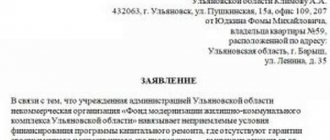Legal provisions requiring the payment of contributions to the capital repair fund
The main motivation for not transferring funds to the capital repair fund is distrust of the management company and the persons responsible for collecting money for subsequent work. However, the legality of collecting fees is described in Federal Law No. 271, according to which homeowners are required to pay receipts from the regional operator every month.
The law provides for circumstances under which the owner is exempt from paying:
- if the apartment building is recognized as unsafe;
- the building is listed on the municipal balance sheet;
- the property has not undergone the privatization procedure;
- a deferment order has been issued by the local authority.
If they refuse to transfer funds, the capital repair fund has the right to sue the defaulter and impose a number of penalties.
The state is given the authority to influence the debtor using various methods. For example, seize property, block bank accounts, and also forcibly collect debt through the judiciary.
Watch the video: “A real case from judicial practice on major repairs.”
What could be the consequences of non-payment?
- Failure to pay for major repairs will result in penalties for the owner, namely the accrual of penalties . You can see the fine by receiving a receipt from the housing and communal services department. The accrual of penalties, as a rule, begins six months after the owner fails to pay for repairs.
INFO! The size of the fine and the period after which it begins to accrue differ in each subject of the Russian Federation and are established by local authorities.
- In addition to a fine, for persistent defaulters of major repairs, ignoring this obligation may result in a claim from the fund . According to the Law, the owner can file a counterclaim to challenge the fund's claim. However, as practice shows, in the overwhelming majority of cases, the tenant fails to defend his opinion and the fund collects from him the full amount of debt under the Kyrgyz Republic.
- If after this the owner continues to ignore the obligation to pay for major repairs and the resulting debt, the next penalty will be the seizure of personal property (to repay the debt) or blocking of a bank account . In this case, the debtor will have to pay not only the debt for major repairs, but also the services of a legal specialist to protect his interests in court.
- An owner with a debt for major repairs may have difficulties selling an apartment . When receiving certificates from the housing and communal services department, its employees may refuse the tenant, citing the need to repay the debt under the Kyrgyz Republic (for legitimate reasons). A potential buyer of an apartment will also require the buyer to provide documents confirming the absence of any encumbrances on the acquired real estate, in particular the existing debt for major repairs;
- Imposing a ban on leaving the country . A similar measure can be applied if the amount of debt for major repairs exceeds ten thousand rubles;
- Eviction from the apartment. This is quite an extreme measure, which can only be applied if the amount of debt incurred for major repairs amounts to the market value of the property. The fund can achieve the eviction of a persistent defaulter only in court by filing an appropriate claim. First, the home is put up for sale, after which the amount of debt, legal costs, penalties, etc. are added. If after paying off all the above items there is some amount of money left, it is not transferred to the account of the former owner of the apartment.
Can they sue for non-payment of capital repairs - grounds
The definition of “Fund” is described in Art. No. 7 Federal Law No. 7 (with new amendments and additions for 2021), which relates to non-profit organizations. Based on the provisions of the law, such a company has the right to create individuals and legal entities. The transfer of funds to the fund's account is based on voluntary consent to ensure purposes related to various types of activities.
In Art. No. 26 of this regulatory act specifies the process of crediting money and establishes two types of payments - one-time and monthly. Additionally, the Fund’s account can be replenished by selling products, performing a number of works, and through other sources of profit.
The Russian Housing Code (Article No. 153) states that apartment owners are required to financially provide receipts for utility services, including for common property. The mandatory types of payments also include contributions for major repairs. Owners begin to transfer money after holding a general meeting of residents and approving the procedure for generating funds - special. account or regional operator.
This obligation comes into force from the moment the apartment building is included in the capital repair program - Article No. 169. Work may be carried out at the expense of the Homeowners Association Fund or another association in accordance with the intended purpose - Art. No. 169 point No. 4. If you refuse to pay or ignore incoming receipts, the operator or the Partnership has the right to collect debts for major repairs through the court.
The procedure for considering cases of debt collection for major repairs
Cash provision for contributions for major repairs is a sore subject for most owners of apartment buildings.
Typically, debt is formed for a number of reasons:
- lack of money to pay the fee;
- fundamental ignorance;
- filing a claim against the regional operator for a refund;
- other.
Debt collection procedure
The Capital Repair Fund has the right to sue for non-payment, but to do this, the organization must comply with the established regulations for debt collection.
Pre-trial claim
A pre-trial claim is a mandatory element of resolving a dispute. Often the debtor receives payment within 2-3 months. written notices demanding payment of arrears. If the regional operator refuses to top up the balance, the regional operator will initiate legal proceedings. The letter of claim serves as evidence of an attempt to resolve the issue amicably and indicates that the defaulter has been notified of the existence of a debt.
When is a court order issued to collect a debt?
Preparation of a court order is carried out within five working days from the date of receipt of the claim and documentation. However, the date of assignment of legal status may differ from the day the paper was drawn up. However, the time is always written in the text, because otherwise the bailiffs will have difficulty executing the decision.
The procedure for executing an order (court decision) for debt collection
The execution of a judge’s decision is subject to Federal Law No. 229. According to the current provisions of the regulatory document, the order takes on legal status within 10 days after its adoption. However, bailiffs are often faced with a situation where the text does not contain an effective date. Therefore, FSSP employees need more time to resolve the legal conflict.
Having processed the decision and received an explanation of the case, the enforcement order has the following stages:
- A decision is made on the registered application.
- Objections from the defendant are expected.
- The document is submitted to the FSSP at the debtor’s residential address.
- Enforcement actions are initiated.
- The bailiff comes to the individual at the place of registration or summons him to the department of the institution.
- An inventory and assessment of the citizen’s financial situation is carried out - sources of income are identified.
- Forced debt collection.
If you voluntarily pay off the arrears for major repairs at the initial stage, you can avoid blocking accounts and putting the property up for auction.
Procedure for paying debts and penalties
Reasons to pay for utilities.
For 2021, the housing cooperative legally uses leverage over the debtor for major repairs - the imputation of penalties. This method of combating arrears was previously the prerogative of supervisory agencies. The procedure for collecting fees for special account or to the Fund - priority payment. Refusal or ignorance of this type of payment will result in fines, which can also be collected through the judiciary.
Note: When, as part of a purchase and sale agreement, a person purchases an object with debt for major repairs, the new owner is obliged to pay off the arrears. Experts recommend checking the register of debtors to the regional operator before concluding a transaction.
Penalties are calculated according to a simple algorithm. If the monthly installment is not paid the next day, the debt increases according to the current interest at the refinancing rate - 1/300. The penalty is accrued until full repayment.
On the one hand, the amount of the penalty is small, on the other hand, when it is applied to the total mortgage every day, then after 2-3 months, the amount becomes significant. In addition, the management organization has the right to initiate legal proceedings to collect contributions. The defendant will be required to pay costs.
In what cases can you not pay fees?
Some categories of individuals fall under an exception to the current law on capital repair contributions.
Citizens are fully or partially exempt from depositing funds on the basis of Article No. 169, paragraph 2.1:
- persons who do not have a job and live alone - provided that they are over 70 years of age;
- unemployed pensioners living together;
- people with disabilities with 1 or 2 disability groups;
- veterans of the Great Patriotic War;
- having the status of “Honorary Citizen” of the Russian Federation or a subject;
- if the house is assigned the article “emergency”;
- owners of apartments in new buildings - before the expiration of the warranty period;
- council housing tenants;
- non-privatized objects.
How to win a court overhaul
Optimal scheme of a regional overhaul system.
In recent years, judicial practice in government cases against individuals, as part of the collection of debts for major repairs, has been increasing. The number of precedents is growing, and decisions are no longer so clear-cut. However, according to statistics, out of 100 cases, 96 people lose the proceedings. As a rule, to win a court case for major repairs, you need the help of a lawyer and a strong evidence base.
The settlement of controversial situations in this area lies within the competence of the world and regional authorities of the highest authorities. If the verdict is negative, an individual has the right to file a petition with the Constitutional Court or the Supreme Court of Russia.
Grounds for canceling a court order (court decision) on debt collection
Cancellation of a court order to collect debt for major repairs is carried out on the basis of a petition filed by the debtor. For this purpose, a period of 10 days is provided after receiving a copy of the decision. The application should be written based on the rules of a business letter. There is no need to indicate the reasons for the cancellation - it is enough to express disagreement with the decision.
When forming a petition, experts recommend making a note about the true reason for the objections - for example:
- violation of the terms of the contract by the regional operator or HOA;
- no debt;
- the specified period for executing the order is unacceptable;
- unauthorized introduction of adjustments to the terms of the contract by the Capital Repair Fund;
- illegal tariff increases;
- change in the financial status of a citizen;
- difficult life circumstances.
It is noteworthy that most people are aware of their rights, which can and should be protected. However, appeal is often not possible, so the court decision is executed in full.
How to challenge a court order
A court order to collect debt for major repairs may be challenged.
A citizen must send an application to the highest authorities - there are three ways to do this:
- contacting the department office;
- through a person authorized by a power of attorney (vised by a notary);
- Russian Post.
List of information that must be indicated in the text of the application:
- The header contains the details of the authority, the personal form and registration address of the debt collector, as well as information about the individual (debtor).
- The name of the document is indicated in the center - “Objection to the Statement of Claim.”
- The main part should contain the following information:
- Court order number, date;
- grounds for legal appeal - Articles No. 128 and 129 of the Code of Civil Procedure of Russia.
- Next, make a request to cancel the decision.
- Date, signature.
To win the proceedings, you must attach a package of papers indicating the validity of the plaintiff’s position. Additionally, a copy of the order, payment receipts, etc. are attached.
A sample petition to cancel a decision on contributions for major repairs is available for download here.
Objection to the claim of the capital repair fund
If a registered letter with a court order attached is received at the address of the apartment owner, then the citizen has no more than ten days to file a petition. In the absence of a corresponding application, the supreme authority will transfer the writ of execution to the FSSP unit.
After this period, it is impossible to cancel the decision. The exception is the provision of evidence of good cause.
Sample objection to a court order for major repairs.
Filing a petition to apply the statute of limitations
Upon receipt of a court order for the forced collection of arrears under the article “major repairs,” a citizen has the right to file an appeal. Otherwise, the bailiffs will begin enforcement proceedings.
The action consists of drawing up an application for the application of the statute of limitations on debts. However, there is an important point - it is necessary to take into account the period specified in the creditor’s claim. If it exceeds three years, the court will accept the petition. When the owner made payments at this time, the chance of winning the case was insignificant.
The document may be submitted in person through the department office or by registered mail. Having considered the petition on its merits, the higher authority cancels the previously issued order. However, the claimant will correct the comments and re-initiate the proceedings.
Template for an application to the court on the application of the limitation period.
Is it possible to sue a fine for debt for major repairs?
You can partially or fully return the fines that the Capital Repair Fund previously charged to the apartment owner on the following grounds:
- Expiration of the debt limitation period. To use this provision, you must contact the judicial authorities with a corresponding application. It is permissible to apply this basis if the period is more than 36 months. The company that manages the apartment complex or the regional operator by law has the right to collect debts only for the specified period.
- Initiation of bankruptcy proceedings for an individual. The process is endowed with a number of difficulties and entails negative consequences for the citizen. In this case, experts recommend contacting lawyers.
- You can return penalties if the creditor company ceases to exist.
- Concluding a peace agreement with the regional operator or management company on the write-off of penalties. Of course, not every organization will take such a step, since some of the funds are lost, but you can try. In addition, it is possible to put forward a proposal to pay the entire amount of the debt, but with a deferment or on schedule.
- Bringing evidence about the occurrence of difficult life circumstances - difficult financial situation due to loss of work, serious illness, etc.
Preparing a counterclaim
The existing procedure for paying for major repairs.
The legislation of the Russian Federation establishes the obligation of owners of apartments located in apartment buildings to financially provide contributions for major repairs. It does not matter who the recipient of payments is - a regional operator or a special one. house account. Each owner of a residential property bears the burden of this expense item. At the same time, the Overhaul Fund, although it has the status of a non-profit organization, received a legal basis for collecting such payments.
If receipts are not paid, the institution has the right to initiate debt collection through the court. It is almost impossible to challenge the issued order. Therefore, in most cases, when receiving a resolution, owners replenish the balance of their personal account.
However, if citizens discover an error in an order, a violation of requirements or terms of a contract, they have the right to file a counterclaim with the Arbitration Court to protect their own interests. The application must be accompanied by documents that serve as evidence of the validity of the application.
If funds are collected without reason, then in refusing to pay the receipts, it is necessary to indicate the illegality of the actions of the regional operator for major repairs.
An example of drawing up a counterclaim.
Cancellation of a court order
This is the situation: on May 24, 2021, I took out a loan from an MFO, on March 17, 2020, the court issued an order to write off the debt, 10 thousand were written off in favor of the MFO, the balance was 30 thousand.
Within 10 days, I wrote an application to cancel the court order, it was granted, and the arrest was removed from the cards. Cancellation dated August 4, August 24 I received a notification to pick up a letter canceling the order. Within 15 days, MFOs could have filed a counterclaim, but they did not. Should this be considered as debt forgiveness? And will there be debt in the CI? If enforcement proceedings are terminated?
They could file a complaint against the cancellation within 15 days. At the same time, no one is stopping them from filing a lawsuit at any time in accordance with the general procedure. The expiration of the statute of limitations does not terminate the obligation to repay the debt. Even if they go to court and the court refuses on the grounds that the statute of limitations has expired, you owe them, but they will not be able to forcibly collect it, and it will hang on for the rest of their lives. Until they themselves forgive and write it off.
After the court order is canceled, the debtor can at any time file a lawsuit against you to collect the debt.
“Within 15 days, MFOs could file a counterclaim” - where did you read that? There is no need to sell any counterclaim to the MFO. A claim can be filed at any time after the court order is canceled (the claim is not a counterclaim, but simply a claim).
Nobody wrote off your debt. They will recover the claim minus the interest paid and accrued again. This will be written below.
Calculate how much money an MFO can collect from you.
Under agreements concluded from January 1, 2021, MFOs do not have the right to accrue interest to an individual borrower after their amount reaches three times the loan amount
(this restriction does not apply to penalties (fines, penalties), as well as payments for services provided to the borrower for a fee).
Another limitation concerns late repayment of a consumer microloan: after a delay occurs, the MFO can charge the debtor interest only on the remaining (outstanding) part
amount of the principal debt, but accrual must stop as soon as interest reaches twice the amount of this amount. The MFO will be able to start accruing interest again only after the borrower has partially repaid the loan and (or) paid the interest due.
Each MFO is required to place information about these restrictions on the first page of a short-term consumer loan agreement before the table with the individual terms of the agreement.
The microfinance organization has the right to file a claim as it sees fit, and you consider the statute of limitations (SOL) to be 3 years from the date the prophet began paying off the debt according to the payment schedule. The LED is extended for the duration of the joint venture, which is 4 months and 18 days. If the total duration of the LID is less than 6 months, then it will be extended to these 6 months.
What 15 days are you writing about and what counterclaim are you talking about?
How to sue the capital repair fund
The Overhaul Fund is responsible for fulfilling its obligations, including if the contractor provided poor-quality services. For example, when, after work on the roof of an apartment, flooding occurs and the organization’s guilt is proven, the owner has the right to go to court. As compensation, you can demand to pay for the restoration of property, moral damage, and also impose a fine against the regional operator.
Complaint about the fund's inaction
According to Article No. 182 of the Housing Code of Russia, the Capital Repair Fund is obliged to provide preparatory measures for buildings before carrying out work to replace the elements of the apartment building. In addition, it is within his competence to approve design papers and decide which contractor to enter into an agreement with. Consequently, the regional operator is responsible for the results of the services provided.
To sue the capital repair fund due to the inaction of the regional operator, you need to contact the management organization or the chairman of the HOA with a complaint. These persons are responsible to the owners of apartment buildings for the proper performance of work on the maintenance and management of common property. Institutions are authorized to initiate proceedings with the regional operator through the court.
Sample complaint about the inaction of the capital repair fund.
Claim against contractor for poor quality work
The Capital Repair Fund is also responsible to the owners of MKD apartments if the contractor repaired the house poorly (Article No. 182, clause No. 6 of the Russian Housing Code). A claim on this issue can be filed by both owners and authorized persons - management companies, homeowners' associations.
A lawyer will help you draft a complaint or statement correctly.
The jurisdiction of the case is determined by the amount of claims:
- up to 50,000 rubles – magistrate;
- over 50 thousand rubles. – district.
You can appeal the decision of these authorities in the Supreme Court.
Legal consequences of canceling a court order for a capital repair fund
After the court order is cancelled, the capital repair fund has the right to seek recovery in the general manner by filing a claim. In this case, the state duty is paid in full and the claim is considered on its merits with the summons of the persons participating in the case.
Let us note that the court will collect contributions for capital repairs from the owner, subject to their non-payment in any case, arguments about the absence of an agreement with the management company, and information about actual residence in another place will be perceived critically by the court, since the law imposes a direct obligation on the owners to bear the costs of capital repair.
In case of cancellation and consideration of the case according to the general rules, it is necessary to declare that the statute of limitations has expired if fees are collected for a period exceeding 3 years from the date of filing the case in court. If the claims are partially satisfied, legal costs will also be partially recovered.
In conclusion, we note that the cancellation of the court order for major repairs will allow you to delay the moment of payment, and also, in the case of unaccounted payments, provide evidence of payment of contributions and declare that the statute of limitations has passed. One of the negative consequences may be an increase in legal costs, which will subsequently be borne by the debtor, due to an increase in state fees and representation expenses. Contributions for major repairs by a court decision will be assigned to the owner of the residential premises in proportion to the share of his ownership.










